Tackling the global climate emergency requires a fundamental redistribution of financial resources, writes Aaron White. The U.S. president shows no sign of leading the way.
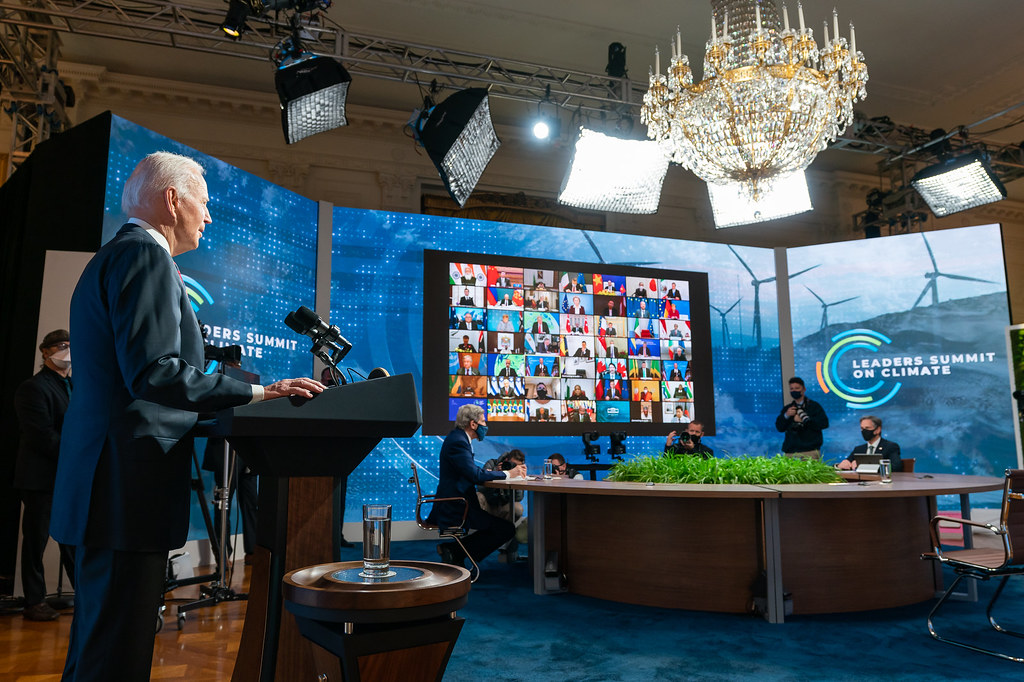
U.S. President Joe Biden delivering remarks remotely to world leaders during a “Raising Our Climate Ambition” session on April 22. (White House, Adam Schultz)
By Aaron White
OpenDemocracy
 “Nothing would fundamentally change,” Joe Biden reassured donors at a fundraising event at the Carlyle Hotel in Manhattan in June 2019, amid the backdrop of his presidential primary bid. So far, he has kept his word.
“Nothing would fundamentally change,” Joe Biden reassured donors at a fundraising event at the Carlyle Hotel in Manhattan in June 2019, amid the backdrop of his presidential primary bid. So far, he has kept his word.
It has now been nearly a year since Biden entered the White House. During his first week in office, he rejoined the Paris Agreement, vowed to stop oil and gas drilling on public lands and committed to passing a historic infrastructure package that would create millions of well-paid union jobs.
 It was no Green New Deal, but the U.S. administration appeared to have at least listened to the left’s demands. Sunrise Movement climate activists, Bernie Sanders and other progressive groups were reportedly given a seat at the table to negotiate the administration’s agenda. Biden established new climate offices — an international one led by the former secretary of state, John Kerry, and a domestic one led by Gina McCarthy. In April, he even hosted world leaders to announce a new U.S. target to reduce emissions by 50-52 percent from 2005 levels by 2030.
It was no Green New Deal, but the U.S. administration appeared to have at least listened to the left’s demands. Sunrise Movement climate activists, Bernie Sanders and other progressive groups were reportedly given a seat at the table to negotiate the administration’s agenda. Biden established new climate offices — an international one led by the former secretary of state, John Kerry, and a domestic one led by Gina McCarthy. In April, he even hosted world leaders to announce a new U.S. target to reduce emissions by 50-52 percent from 2005 levels by 2030.
And soon, Biden will head to the UN climate change conference, COP26, in Glasgow, Scotland, with nearly his entire cabinet in tow, to lecture the world on the need to transition to green energy as soon as possible to limit global warming to 1.5C?
However, he’ll likely arrive without anything to show.
He is departing from a city lined with climate activists demanding that the administration revoke the permit for Enbridge’s Line 3 pipeline, which will transport oil from Canada to the U.S., and declare a climate emergency (which he has the authority to do without congressional approval). And he leaves a congress whittling down his signature legislation ahead of an impending Oct. 31 deadline set by House Speaker Nancy Pelosi. (The White House denied this deadline on Tuesday.)
“Biden is going into COP26 still without any climate laws on the book,” Kate Aronoff, climate reporter at The New Republic and author of Overheated, told me last week.
“There was a lot of hopeful rhetoric at the start of the administration, and it’s true that the Biden White House has some of the most ambitious climate pledges and commitments of any Democratic administration to date, but there’s still nothing there.”
So what is Biden’s climate legacy thus far — and what can he unilaterally do? I’ve been speaking to experts over the past week and have found a deep frustration at not just the lack of congressional action or political will, but at a failure by Biden to directly confront the U.S.’s deeply entrenched fossil fuel industry.
Climate Legislation
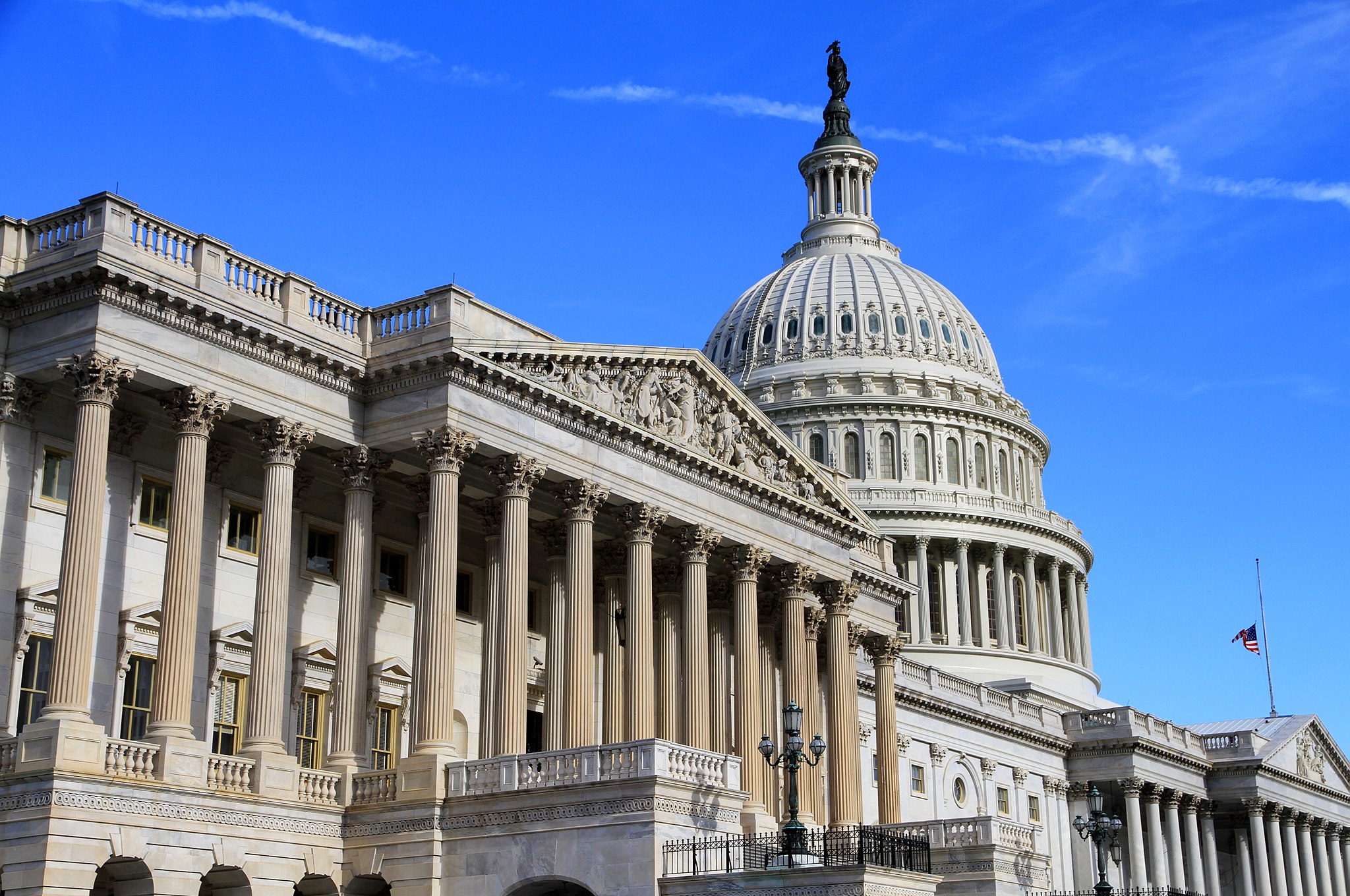
U.S. Capitol. (Ingfbruno/Wikimedia Commons)
The congressional packages are central to the administration’s climate agenda. Following bipartisan negotiations, the White House decided to pair a $550 billion bipartisan infrastructure deal with a larger $3.5 trillion reconciliation package (in a process that avoids the Senate filibuster) passed on a party-line vote.
Although this sounds like a lot of funding, both packages fall far short of the public investment that economists say is needed to halve carbon emissions by 2030.
What’s more, the original top-line figure, $3.5 trillion, reserved for the reconciliation bill (which is already shrinking by the day) represents just 1.2 percent of the U.S. economy over the next 10 years.
“It doesn’t come close to what even many mainstream economists who focus on climate change say is necessary, which is about 4-5 percent of GDP,” said Thea Riofrancos, an assistant associate professor of political science at Providence College and the author of Resource Radicals: From Petro-Nationalism to Post-Extractivism in Ecuador.
Please Support CN’s Fall Fund Drive!
The $3.5 trillion package nonetheless would be the U.S.’s most significant domestic policy in a long time. It would expand the “child allowance,” institute a national paid-leave program, fund universal pre-kindergarten for under-fives and two years of free community college and expand Medicare to include dental, vision and hearing, as well as other public investments.
It would also include a clean-electricity payment program (which would essentially pay utilities that use renewable energy and fine those that aren’t transitioning to doing so) and clean-energy tax incentives, which would expand the existing credits available for wind and solar and make them refundable — the two centerpiece climate policies in the package.
However, the package is currently being cut to appease Sens. Kyrsten Sinema and Joe Manchin, who both oppose the current spending figure. Over the weekend, The New York Times reported that Manchin is opposed to the clean-electricity program — the bill’s main climate policy. (Manchin made $500,000 last year from a coal company owned by his son and takes in more fossil fuel cash than any other senator.) On Tuesday, Biden told lawmakers that $1.9 trillion should be the new target, with likely cuts to the universal community college fund and the clean-electricity program.
“Without passing that reconciliation bill, the U.S. has zero ‘leadership’ on climate when it shows up to COP26,” Riofrancos told me last week.
With the rumored end of October deadline fast approaching, it’s increasingly possible that Biden will not arrive at COP26 with signed climate legislation. As Riofrancos told me, that 24-hour window at the end of the month will determine “whether or not the U.S. comes to the table with something or comes to the table with nothing — but continues to make it seem like every other country in the world is the problem as to why we don’t have climate action”.
What Can Biden Unilaterally Do?
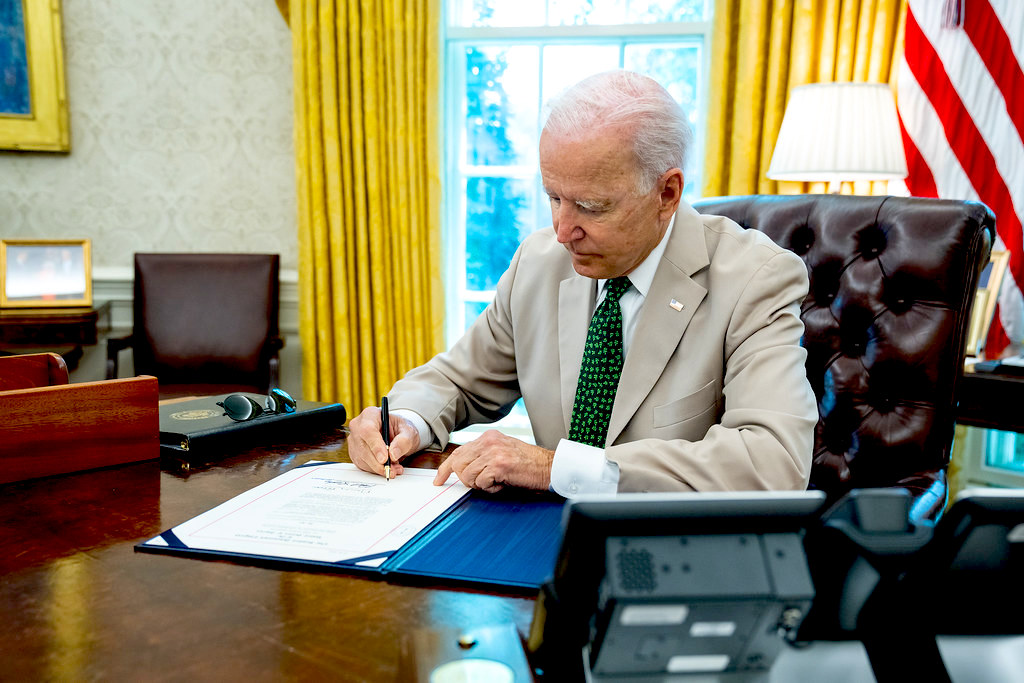
U.S. President Joe Biden signing legislation in August. (White House, Adam Schultz)
The Democrats have the smallest possible majority in the Senate, not to mention some members who are wholly wedded to big-money corporate interests — meaning it remains to be seen what substantive climate policy (if any) will be agreed on before the start of COP26. But, if Biden is indeed a climate champion, there is still significant executive power that he can tap into.
He came to office pledging to end new drilling on federal lands, however, in June, a judge swiftly overruled the promised temporary suspension on the grounds that it financially harms oil-producing states. Now the administration is on track to approve the most drilling permits on federal land since George W. Bush was in office. The U.S. is currently the world’s largest producer and consumer of oil and gas.
Max Moran, a research director at the Revolving Door Project, which scrutinizes executive branch personnel, told me he has been “deeply disappointed” in Biden’s executive actions — or lack thereof — on climate policies. “He controls this entire federal bureaucracy and there’s an enormous number of things you can do on [climate],” Moran said.
For starters, the administration could revoke the permits for pipeline constructions (Line 3, Line 5, and Mountain Valley) and declare climate change a national emergency — which would open up vast federal resources and capabilities. Biden could also reinstate a ban on crude oil exports which was lifted in 2015 under President Barack Obama.
This is indicative of the administration refusing to directly confront the fossil fuel industry. “Biden could reinstate [the crude oil ban] as soon as he wants to, but we’ve seen consistently an unwillingness to meaningfully challenge the fossil fuel industry in really any way,” Aronoff added.
And it’s not just a matter of political will. Many official members of the administration have ties to the oil and gas industry.
One of these figures is Amos Hochstein, who was a marketing executive for the fossil fuel company Tellurian. Now, Hochstein is essentially promoting American gas internationally as the State Department’s senior adviser for energy security.
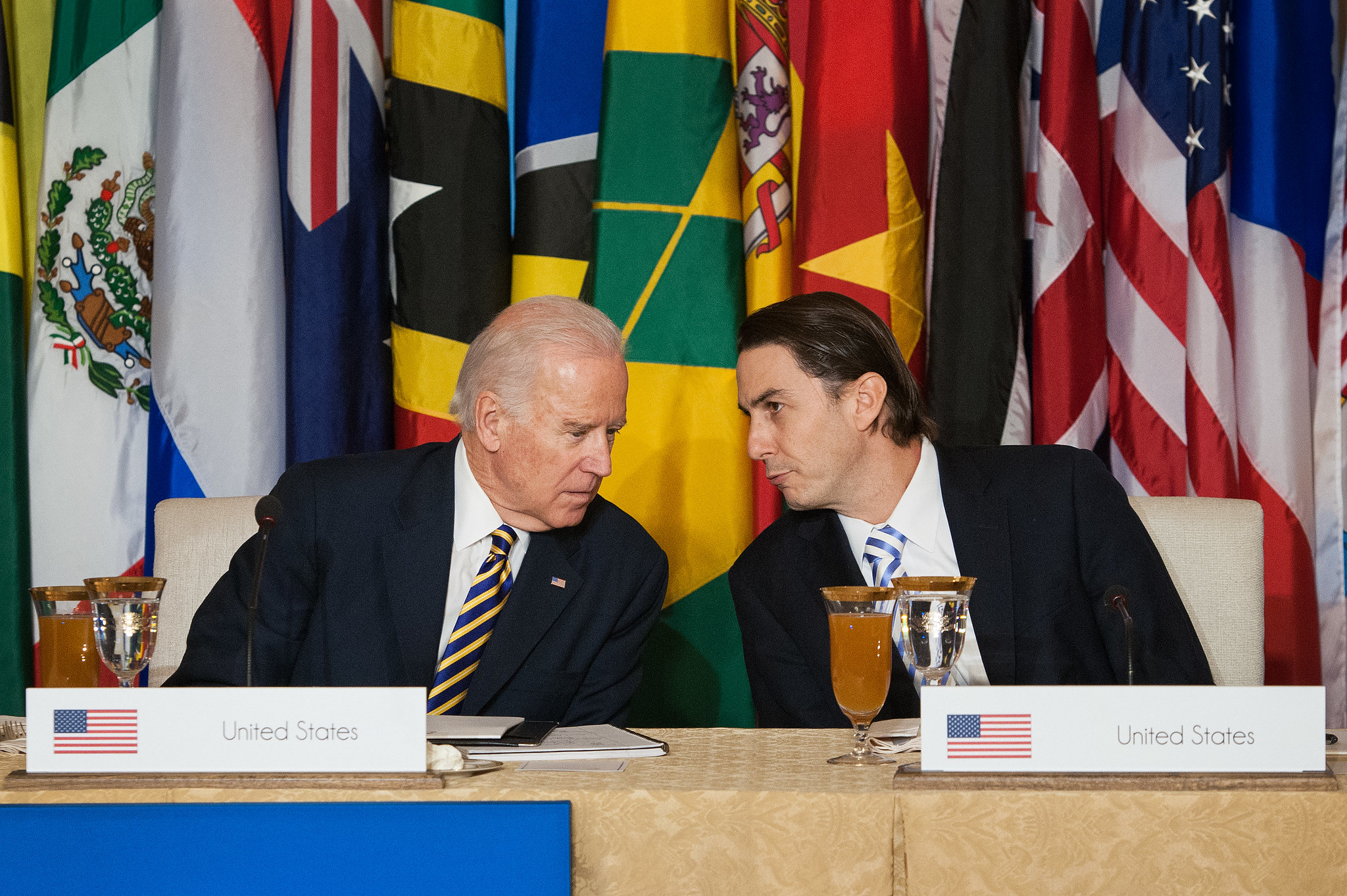
Jan. 26, 2015: Joe Biden, while serving as vice president, listening to Amos Hochstein, then special envoy for international energy affairs during a multilateral meeting on Caribbean energy security. (State Department)
Susan Rice, Obama’s former national security adviser and current director of the Domestic Policy Council, also has had strong financial ties to the fossil fuel industry — holding investment stakes in Enbridge (the Canadian oil and gas company). Rice has since been ordered by federal ethics regulators to divest her holdings.
Biden also nominated Neil MacBride to be general counsel of the Treasury Department. MacBride formerly worked at the corporate law firm Davis Polk, where he sued the Treasury Department on behalf of Exxon.
Dorothy Slater, who focuses on climate finance at the Revolving Door Project, told me that the Biden administration — whilst less publicly corrupt than Trump’s — is still hiring figures wedded to the fossil fuel industry. “Biden is not putting in the CEO of Exxon. But he is putting in a lot of people who are just removed [from that position],” she said. “They lobbied or they worked for big law firms that represented oil and gas firms.
“We’ve seen Manchin trying to put coal and methane gas in as part of the clean-electricity standard, which is completely unacceptable. But at the same time that’s the standard in this setting with [Biden’s] nominations, appointments, and executive actions.”
Biden could also listen to the United Nations High Commissioner for Human Rights and release Steven Donziger — an attorney who led a lawsuit against Chevron on behalf of Indigenous peoples and farmers in the Amazon. In 2019, Donziger was countersued by Chevron, and has since been under home arrest for nearly 800 days and sentenced up to six months in federal prison on contempt for refusing to turn over electronic devices.
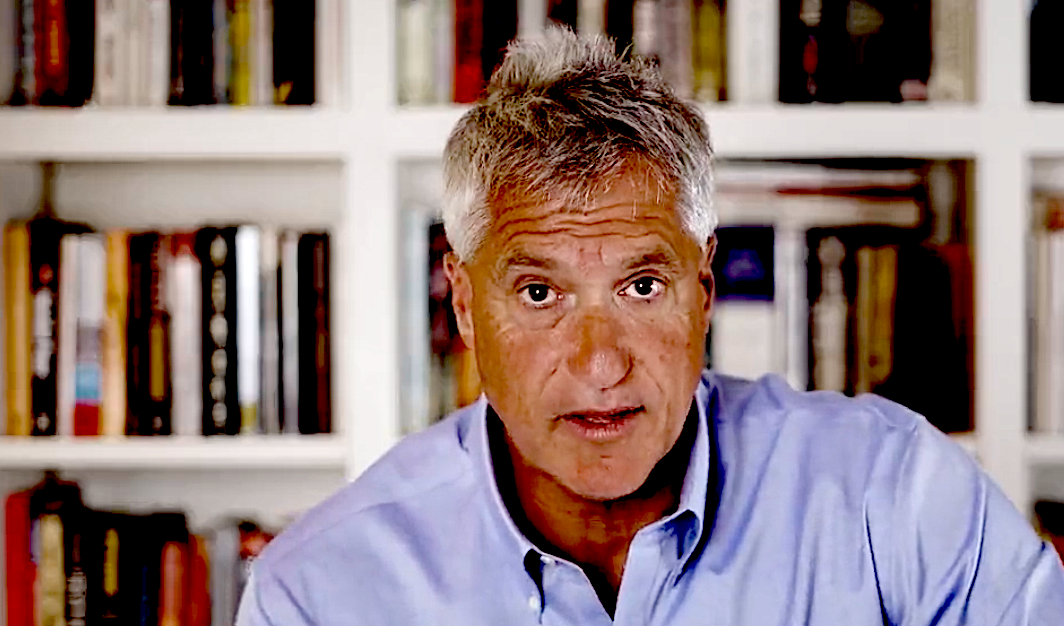
Steven Donziger in a video message to supporters on Sept. 30. (Steve Donziger, Twitter)
Biden, however, has instead hired several lawyers from the law firm currently used by Chevron, Gibson Dunn, to executive positions. These include Jose Fernandez (under-secretary of state for economic growth, energy and the environment), Stuart Delery (deputy White House counsel) and Avi Garbow (senior counselor to the Environmental Protection Agency administrator — a post Garbow has since left).
US Influence
The U.S. holds tremendous influence on the global economic stage, with veto power in the World Bank and International Monetary Fund and an outsized role in bilateral and multilateral trade agreements. But as Aronoff emphasized to me, “so far [the U.S.] has been pretty reluctant to use it” to drive action on climate change.
As the largest historical carbon emitter, the U.S. has a disproportionate responsibility to assist the Global South and countries least responsible for the crisis. It could start by acting decisively on a technology transfer and waiving intellectual property rights for green technologies.
The U.S. could also fundamentally reshape the global power and economic imbalances that hinder poorer nations’ ability to transition to a carbon-free economy. According to Riofrancos, the U.S. should “use its weight … to reduce, at least, if not outright cancel the sovereign debt that is an oppressive financial burden on so many Global South governments.”
And it’s not just cancelling debt. Tackling the global climate emergency also requires a fundamental redistribution of financial resources. “It’s time for some form of global redistribution to happen under the banner of fighting climate change, because these governments do not have the resources to move away from fossil fuels,” Riofrancos added.
However, given Biden’s personnel and precedent, this is highly unlikely. Year after year, the U.S. tends to send the same sort of personnel to the UN climate conferences, who are always wedded to the status quo.
This is why, for Aronoff, the key question this year “is whether we’ll continue to see business as usual from the very steady set of American technocrats who tend to do the negotiating at COP, whether it’s in the Obama administration, the Trump administration or the Biden administration … [who] evade any questions of historical responsibility and any questions about loss and damage financing or any real transfer of resources to climate-vulnerable countries.”
The signs so far are not encouraging, with John Kerry continuing to lecture the world about cutting carbon emissions, while the administration publicly calls on the international community to pump more oil.
Indigenous-Led Mobilization
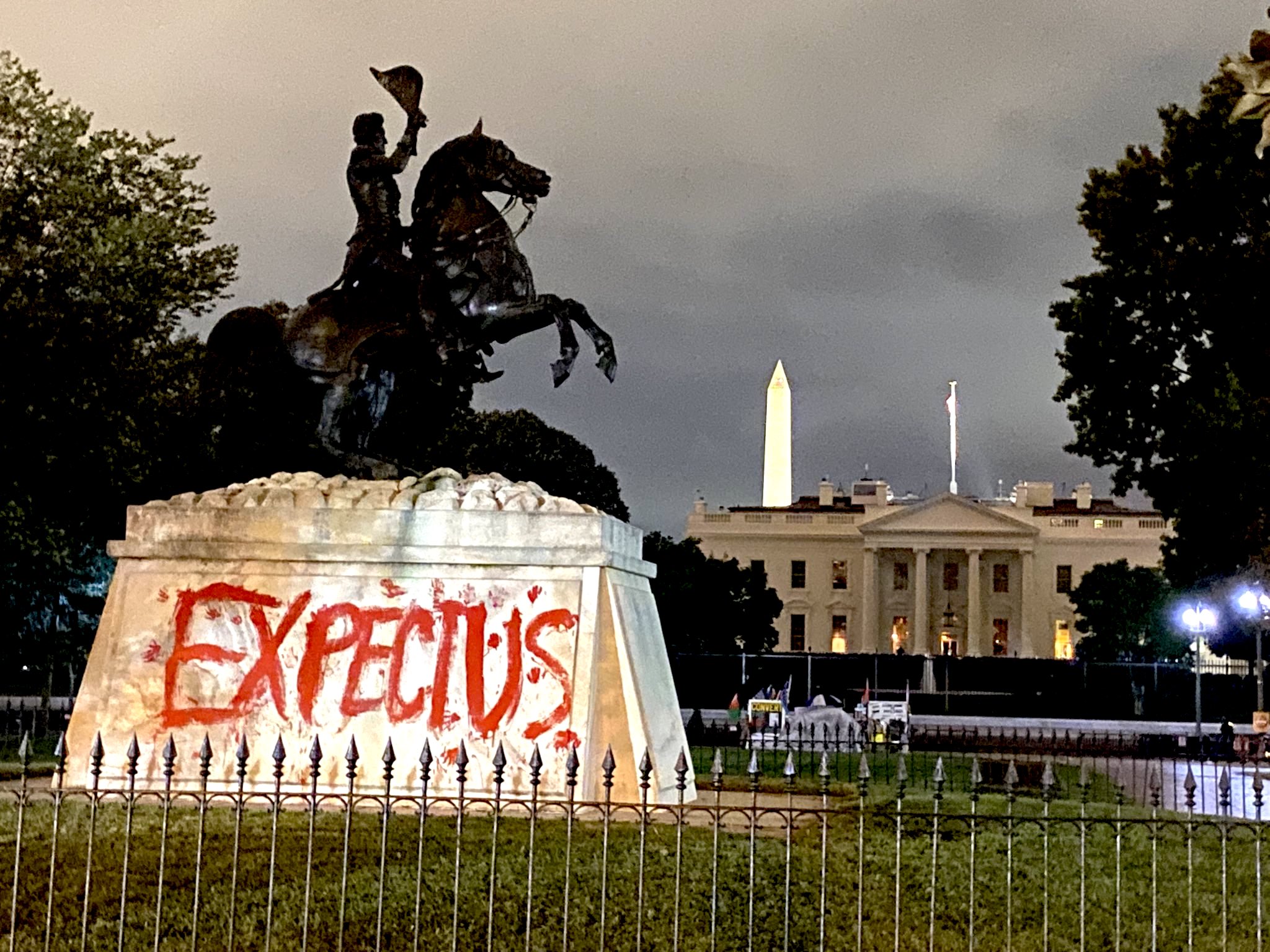
“Expect Us” painted on the pedestal of a statue of Andrew Jackson, the seventh U.S. president known to Cherokees as “Indian Killer,” ahead of Indigenous People’s Day protests against the Biden administration’s backing of fossil fuel projects. (Jennifer K. Falcon, Twitter)
Last week, a historic Indigenous-led mobilization “People vs Fossil Fuels,” in Washington, D.C., called on Biden to stop fossil fuel projects and revoke Enbridge’s Line 3 pipeline in Minnesota. More than 530 activists were reportedly arrested.
Indigenous communities have long been at the forefront of disrupting the extraction and infrastructure of fossil fuels. A new report by the Indigenous Environmental Network and Oil Change International found that Indigenous resistance has stopped or delayed at least a quarter of annual U.S. and Canadian greenhouse gas emissions.
According to the UN’s Intergovernmental Panel on Climate Change fossil fuel emissions must immediately be reduced to avoid the worst effects of the climate crisis. Like in many other nations worldwide, the leadership of the U.S. Democratic Party continues to ignore these findings. “Even very progressive-sounding governments have not really internalized this,” said Aronoff.
While more progressive members of the Democratic Party and climate activists have championed bold climate policies, there has still been no implementation by the leadership.
“We need people in power to put those ideas into practice and link them to real sources of public funding. We are at a really crucial moment, needing that implementation and adoption piece of the policy process to take place,” said Riofrancos.
We’re quickly running out of time. For all the good talk, Biden still heads to Glasgow without any significant action.
Aaron White is the North America editor of ourEconomy at Open Democracy. You can follow him at @aaronwolfwhite
This article is from OpenDemocracy.
The views expressed are solely those of the author and may or may not reflect those of Consortium News.
Please Support Our
Fall Fund Drive!


There are several aspects that prevent the West and USA (a bit different from the rest, so far) from tackling global warming effectively.
The first is that electricity is an essential utility, and as Texas and Europe both have shown this year, the “free market solutions” rammed into existence are inadequate. On one hand, one can introduce penalties and subsidies too steer “free market” toward so-called renewables. On the other hand, private player GAIN at the times of shortages caused by vagaries of weather and/or switching off the generating capacity for maintenance and repairs (that can be timed to maximize profits).
The second aspect that reliability of the low-carbon system is impossible at this time without a large base-load capacity of nuclear power.
The evolution of costs of the new energy is left to “ingenuity of the market”. So the go up. There should be some focus on the costs. How can one convince developing countries to embrace new, brave economic model that doubles production costs?
My impression is that corporations mastered the art of suppressing competition and blowing up costs, including the takeover of political/regulatory systems, so we should expect boondoggles and/or revolts of the deplorables. Thus the regulatory approaches that Dr. Frankenstein could approve (stitched from disparate parts), and disregard of economic aspects that CAN be addressed.
While COP26 is looking more and more like FLOP26, as Russian President Putin and China’s X will not attend and India’s PM Modi is still undecided, the chances for Joe Biden’s administration to legislate a Green New Deal and take it to the Hallowe’en Summit of COP26 are now essentially zero. As some Democrats’ in Congress have resisted—or generated resistance by their climate extremism, as the case may be. So Biden has turned, again, to executive orders and regulations, this time to try to show them off in Glasgow. This is because the Clean Energy Performance Program, core of Biden’s Green New Deal, appears to be firmly opposed by at least Sen. Joe Manchin (D-WV). It would require all utilities generating/selling electricity, to increase their share of “renewable,” or unreliable power by at least 4% every year. It would make adding any more reliable form of baseline power a very difficult proposition for almost any utility.
Following the Oct. 15 all-of-government executive order in the form of a “Fact Sheet” from the White House, on Oct. 21 the Financial Stability Oversight Council issued a report to its member regulators telling them to crack down on bank investments and security issuances connected to fossil fuel exploration and power generation. The FSOC report/directive was issued on the same day that the mighty climate warrior of the banking world, Mark Carney, attempted, in an interview with CNBC, to definitively declare trillions of dollars of oil, coal and gas assets “stranded”—barred from exploitation—around the world. Said Carney: “We have … too many hydrocarbons, enormous stranded assets, whether it’s in coal, three-quarters of coal, half of gas, roughly the same of oil, we have too many fossil fuels. This is consistent with the Carney’s and the Davos/WEF’s stated intention to bypass sovereign government and to impose its “Build Back Better” agenda through its control over central banks.
The FSOC is not simply an advisory body. Chaired by Treasury Secretary Janet Yellen, it is the council created by Dodd-Frank of the 15 major U.S. financial, securities, and insurance regulators—the Treasury, the Office of Controller of the Currency, the Federal Reserve, the FDIC, CFTC, SEC, etc. Its “report,” and this is its first report in 12 years’ existence, is actually a directive by the Treasury to the regulators, which will lead to regulations being issued to banks and other financial firms. MarketWatch quoted one enthusiastic financial Greenie: “To unlock that Dodd-Frank power, we need to establish climate as a systemic risk. On this the FSOC was unequivocal — it is a threat to the financial system and all agencies in the FSOC, including the Fed, agreed. That unlocks regulatory power. That’s a big deal.”
We’ve always been at war with EastAsia.
As pathetic as Biden’s appointments are and how lame his actual attempts at anything remotely forward thinking on climate policy are, I can’t help but reflect on the fact that by-in-large, he is doing the will of the people. Unless you live in some little conservation bubble somewhere, people are not conserving–buying bigger gas guzzlers and building bigger homes for smaller families; spending money for fertility and surrogates when they can’t have children rather than spare the planet of ever-increasing population; importing fruit and veg from across the globe so we can have everything in the supermarket 365 days of the year–loosing any sense of eating locally and seasonally; supporting the Walmarts of the world that not only drain money from local economies but who fill their stores with crap no one needs and is better off doing without for the sake of some concept of thrift. Then, we have the institutional complicity that is far from changing. Take Texas A&M and UT who, since 1923, have funded capital projects from the “Permanent University Fund” which is funded by oil and gas revenues–straight into their coffers. Have they sought to divest themselves from these? I think we all know the answer to that question.
And so, we get the administrations we deserve for which the planet and poor of the world pay the price. Biden is just the latest stand-in manipulator-in-chief for the greed-driven American dream. Until the dream changes, the leadership will not.
For that matter, since half or more of all automobiles are parked on the street, will there be charging stations at every parking space?
“if Biden is indeed a climate champion” is the same kind of question as “if Donald Trump is indeed a democracy champion”. To even consider he might be is to be a naïve fool. There is nothing at all in his political history or his present actions to suggest he cares about anything other than pleasing the forces of capital.
And I’d go further than that. I’d say time has already run out. It’s already “game over” for fixing climate change. We can maybe make it “less bad”, but that’s not even certain with big changes. There has to be at least some attention on population growth also. There can’t be any solutions really if population keeps growing and growing and growing. “Planet of the Humans” documentary covers this quite well. The positive feedback loops are already well under way, and it’s obvious that the warming has accelerated beyond our control. Extreme weather is with us now, and it will only get worse no matter what tepid restrictions our useless politicians manage to eke out of their negotiations.
The lack of urgency applied to the climate crisis is indicative of political systems that are broken. Politicians in their bubbles think only of what is realistic and politically achievable. The corporate media, including The Guardian here in the UK, refuse to seriously question the status quo of capitalism and insist that full-blown internationalist eco-socialism – the sine qua non of climate disaster mitigation – is hopelessly unrealistic.